Antibodies are modular defense systems that detect and counter foreign objects such as bacteria and viruses. Each antibody has the capacity to recognize a specific antigen unique to its target as they possess the antigen-binding sites.
Antibodies are now acknowledged to be routine molecules in numerous therapeutic fields, no longer restricted to oncology and inflammation. In other words, the variable regions are now more of a concern to researchers.
The antigen-binding fragment (Fab) is a region of the antibody that binds to antigens. It is comprised of one constant and one variable domain of each of the heavy and the light chains. Only the changeable regions of the heavy and light chains are combined to form a single-chain variable fragment (scFv), which is half the Fab fragment size, yet it retains the original specificity.
Another single domain antibody, small antibody fragment, also referred to as the domain antibody, VHH, VNAR or sdAb, is a type of antibody fragment made up of a single monomeric variable antibody domain and missing the light chain and CH domain of the heavy chain in traditional Fab region.
Both scFv and VHH nanobodies can be bound to the Fc fragment of the required species and retain their specificity and binding properties.
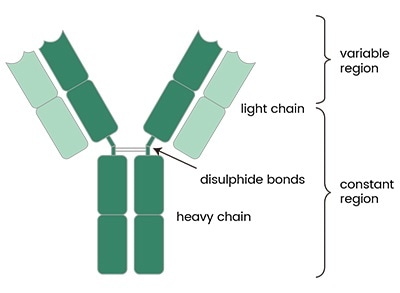
Full IgG Antibody. Image Credit: Sino Biological Inc.
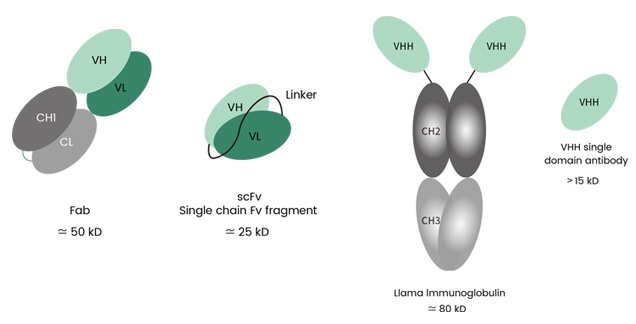
Fragmens: Fab, scFv, VHH (from left to right). Image Credit: Sino Biological Inc.
Each of these antibody fragments, Fab, scFv and VHH, possess a smaller size than a whole antibody. It allows their binding to concealed epitopes not accessible to complete antibodies. The smaller size can help offer lower scattering, thus less contrast in images.
From the perspective of therapeutic applications, a small molecular weight also means fast clearance and efficient penetration. Some therapeutics also use the fragments as they improve penetration into the tissue.
It also could give rise to functional antibody expression and subsequent fusion in bacteria and facilitate their display on filamentous phage.
The blend of small antibody molecules together with the efficient microbial production systems can eventually lead to the creation of a homogenous protein in appropriate amounts for diagnostic and therapeutic purposes as well as in structural studies.
Presently, there are a number of routes to take in order to artificially synthesize an antibody fragment. Many functional antigen-binding antibody fragments could be engineered by proteolysis of antibodies (papain digestion, pepsin digestions or other enzymatic approaches), generating Fab, Fv or single domains (Figure 1).
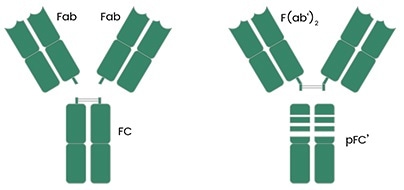
Figure 1. Fab fragment from papain digestion (left) and F(ab’)2 from pepsin digestion (right). Image Credit: Sino Biological Inc.
Over the course of the past decade, progress in recombinant antibody technology has significantly allowed for the genetic manipulation of antibody fragments. All target genes can now be cloned and successfully expressed as a fragment in bacteria, on mammalian cells and even insect cells.
One benefit of this technology is that it could maintain the intact antigen-binding site (paratope) while limiting the size of the antibody molecule.
Antibody and its fab fragment
As a global leader in the manufacture of recombinant proteins and antibody reagents for life science researches and drug discoveries, Sino Biological is a technical specialist in the recombinant expression platform. Sino is delighted to be able to offer competitive services with the highest quality and excellent price points.
Full-length antibody:
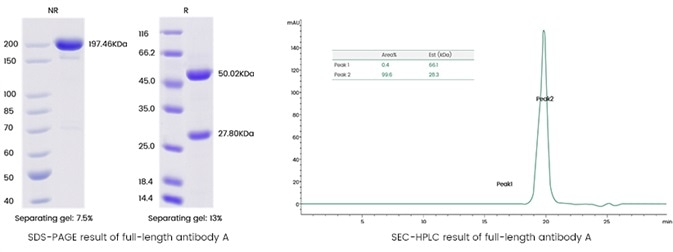
Image Credit: Sino Biological Inc.
Fab fragment:
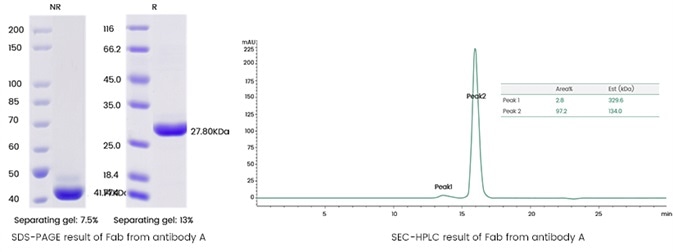
Image Credit: Sino Biological Inc.
About Sino Biological Inc.

Sino Biological is an international reagent supplier and service provider. The company specializes in recombinant protein production and antibody development. All of Sino Biological's products are independently developed and produced, including recombinant proteins, antibodies and cDNA clones. Sino Biological is the researchers' one-stop technical services shop for the advanced technology platforms they need to make advancements. In addition, Sino Biological offers pharmaceutical companies and biotechnology firms pre-clinical production technology services for hundreds of monoclonal antibody drug candidates.
Sino Biological's core business
Sino Biological is committed to providing high-quality recombinant protein and antibody reagents and to being a one-stop technical services shop for life science researchers around the world. All of our products are independently developed and produced. In addition, we offer pharmaceutical companies and biotechnology firms pre-clinical production technology services for hundreds of monoclonal antibody drug candidates. Our product quality control indicators meet rigorous requirements for clinical use samples. It takes only a few weeks for us to produce 1 to 30 grams of purified monoclonal antibody from gene sequencing.
Sponsored Content Policy: News-Medical.net publishes articles and related content that may be derived from sources where we have existing commercial relationships, provided such content adds value to the core editorial ethos of News-Medical.Net which is to educate and inform site visitors interested in medical research, science, medical devices and treatments.